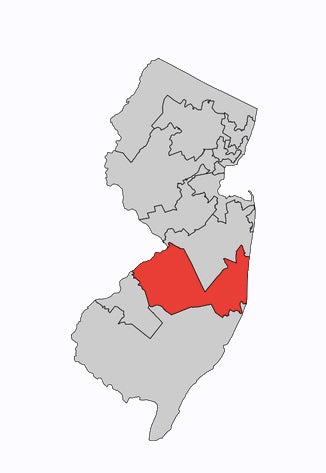Where Aimee Belgard and Tom MacArthur stand on key issues facing N.J.

Tom MacArthur and Aimee Belgard, candidates for New Jersey's third congressional district, appeared at their first debate in Moorestown, N.J. on Thursday, October 2, 2014. (Image courtesy of Anna Savoia)
In the expensive and hotly contested race in New Jersey’s 3rd Congressional District, the candidates hold widely disparate views on a range of topics, including the Affordable Care Act, women’s issues, tax policy, and education.
There also are some surprising areas of agreement.
The Democratic nominee, 40-year-old Aimee Belgard, is a trial and appellate  attorney, a former Edgewater Park committeewoman, and a member of a regional board of the American Cancer Society. She was elected to the Burlington County freeholder board two years ago. She and her husband have two sons.
attorney, a former Edgewater Park committeewoman, and a member of a regional board of the American Cancer Society. She was elected to the Burlington County freeholder board two years ago. She and her husband have two sons.
Her Republican rival, 54-year-old Tom MacArthur, served from 1999 to 2010 as chairman and CEO of York Risk Services Group, which provides claim-handling and other services to insurers. He was a councilman and mayor in Randolph, started a Sandy relief fund, and supported local charities. The couple have an adopted daughter and son; another daughter with special needs passed away.
MacArthur and Belgard are vying to succeed two-term Republican Rep. Jon Runyan, who chose not to run again.
Clashing Along Party LinesBelgard and MacArthur share some positions, largely agreeing, for example, on the need to reform immigration policy and to protect Joint Base McGuire-Dix-Lakehurst in Burlington County from closure or defense budget cuts. But they part ways along party lines in several major areas, particularly healthcare and social issues.
MacArthur wants to repeal the Affordable Care Act and instead encourage competition through tort reform, insurance sales across state lines, and pooling of small businesses health plans. He advocates a state-level safety net for people who can’t get insurance, perhaps through insurer-of-last-resort-type plans and assistance for those who can’t afford the premium.
“Different than Medicaid, I would see this as a basic healthcare policy,” he said in an interview last week. “There’s much better accountability locally and to your state officials, and it’s a better model for helping the uninsured. Somewhere along the line it all has to be paid for, but I think that’s different than being forced into a Medicaid-type program.”
Belgard said she supports the Affordable Care Act because she has seen how it helped people who could not afford insurance previously or who had preexisting conditions. She says the health law needs some changes, such as more transparency on healthcare prices, and needs to address the concerns of small business owners who fear its impact on their bottom lines.
“These exactly are the issues that Congress needs to be talking about, and isn’t, quite frankly,” she said. “It’s not a matter of simply repeal it or simply keep it, but, let’s actually make it better going forward. That’s actually a strong contrast between Tom MacArthur and myself.”
MacArthur opposes same-sex marriage and Belgard supports it. He is pro-life, with some exceptions, and she is pro-choice. Her campaign criticized him for donating to a crisis-pregnancy center in Morristown that discourages women from getting abortions, calling the gift “reprehensible.” In response MacArthur accused her of smearing his family’s charitable efforts.
Belgard’s campaign has sought to tie MacArthur’s position on abortion to a broader difference on women’s rights. She criticizes him for not supporting the Paycheck Fairness Act, a proposed federal law that would make it easier for women to sue employers for pay discrimination, and a minimum wage increase.
“About two-thirds of the folks on minimum wage are women,” she said. “And this is not just affecting women; this is affecting women and their families. These are women that are trying to put food on the table and clothes on their kids’ backs.”
She also points out that New Jersey currently has no women in its congressional delegation.
Common Concerns on Jobs and TaxesThe candidates both say the economy and jobs are voters’ top concerns. MacArthur put out a jobs plan calling for a renewal of federal transportation funding to create construction jobs, a new VA medical center at the Joint Base, less regulation of the fishing industry, tax incentives and reduced export barriers to boost manufacturing, and a number of other measures.
“The federal government can and should have a role, and can do some immediate, specific and concrete things,” he said at the candidates’ final debate on October 17. “I’m the only one of us that has had experience creating jobs, hundreds and then thousands of jobs.”
MacArthur says the tax structure should be flatter and rates lower, and says reforms could entice U.S. companies to bring home some of the estimated $4 trillion in foreign earnings being kept abroad. The reform would allow them to keep the money as a restricted asset and avoid paying taxes on it a second time.
“If they invest it in things we all agree are for the public good, like infrastructure development, like training and development, research and development, then there is a permanent tax benefit to them for doing that,” he said. “What if we brought back just a quarter of that? A trillion dollars in a $17 trillion economy could make a really significant difference.”
He also advocates for a higher child-tax credit, no Alternative Minimum Tax, and increased tax incentives for education costs and for research and development.
On education, MacArthur calls for tenure reform, tying pay to teacher performance, more charter schools, and more federal spending on vocational training. Belgard focuses on student debt, criticizing congressional efforts to reduce grant funding, supporting caps on federal loan repayments, and proposing that students be allowed to refinance their educational debt.
She cited the example of a medical school graduate she learned about who could not rent an apartment in New York because student debt affected his creditworthiness.
“He’s done everything he’s supposed to do, but now can’t live in the area where he was offered a job because of his student loan debt,” she said. “Unfortunately, this story is not unique. It’s really hurting our economy and our job growth in this country.”
Some Surprising AgreementDespite their disagreements, the candidates do see eye to eye on a number of points. They both say they would advocate for small businesses, push for improvements to federal Hurricane Sandy relief efforts, help ensure veterans get job assistance and better medical care, and defend Social Security and Medicare.
Their positions even overlap on some typically polarizing issues.
Both support versions of “tough but fair” immigration reform that would create a process for illegal immigrants to get legal status. MacArthur has sought to take a somewhat harder line, saying such immigrants should not be allowed to pay in-state tuition rates for public colleges. He has repeatedly pressed Belgard but she has declined to take a position, saying it is an issue for the state to decide, not Congress.
Belgard said during a recent debate that she supports the right to bear arms, as her opponent does.
They both emphasize local environmental stewardship, vowing to protect Barnegat Bay and the Pinelands, though, they differ on clean energy. MacArthur favors use of wind power and expanded renewable energy tax credits but opposes a national cap-and-trade program to limit carbon emissions. He supports domestic oil drilling and the proposed Keystone XL pipeline. Belgard attacks “Big Oil” and the nation’s dependence on fossil fuels, citing the impact of carbon emissions on climate change.
________________________________________________
NJ Spotlight, an independent online news service on issues critical to New Jersey, makes its in-depth reporting available to NewsWorks.
WHYY is your source for fact-based, in-depth journalism and information. As a nonprofit organization, we rely on financial support from readers like you. Please give today.




